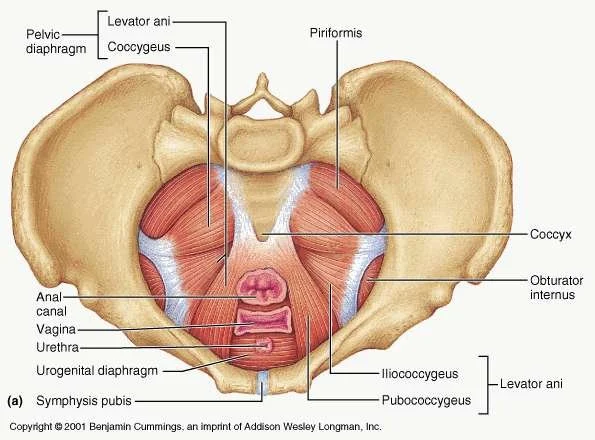The “latent” period of postpartum recovery occurs from 6 weeks to 6 months after delivery but full postpartum recovery takes up to 2 years (that we are aware of in 2025). By that time, your hair should stop falling out. You should no longer have physical symptoms (like bladder leakage or Diastasis Recti). Your period may come back around the 6 month mark, but it could take up to 2 years for your hormones to re-balance. If you’ve had a C-section, you may feel more tired at the 6 month mark than those who had a vaginal delivery. Mentally, you may be getting more into a routine as your baby is sleeping more. Though, of course, it is important to address any lingering mental health concerns.
Bladder Prolapse
Cystocele (SIS-toe-seel) is when the bladder drops from its usual position and presses on the vaginal wall. A type of pelvic organ prolapse, cystocele or anterior vaginal prolapse, can occur if the pelvic floor muscles are weak, the organ is not in the correct spot in the pelvis in general (especially post child birth) or if there is too much pressure put on the pelvic floor. Common causes of a prolapsed bladder include repetitive stress over time (e.g., coughing, improper lifting) or during vaginal childbirth.
Pregnancy & Exercise
Overall, physical activity is highly encouraged for most pregnant women – particularly if you are low-risk. Everyone can benefit from exercise in some form within certain precautions. The most important part is that it feels good to you.
Pelvic Floor Physical Therapy, Melbourne, FL. Pelvic Health Rehab. Pregnancy. Pregnancy and Exercise
Breath Work
Sometimes we just need to take a deep breath for a moment when life becomes too stressful or chaotic or overwhelming. But have you ever noticed how you take that deep breath?
Here at Recharged PT, we’ve talked *a lot* before about the importance of appropriate core engagement for pelvic health. This includes learning how to breathe properly. So today we are going back to the basics to learn how to breathe.
Pelvic Floor Physical Therapy Melbourne FL, Dr. Paige, Dr. Laura, Pelvic Rehab
Obturator Internus Pelvic Floor Pain
The Obturator Internus (OI) is a muscle that sits deep in the hip girdle, running from the front of the pubic bones and inserting onto the greater trochanter (the top bony part of the thigh bone). The OI is a deep hip stabilizer, which means it helps stabilize the head of the femur (thigh bone) to keep it in socket. This muscle is also responsible for external rotation – or rolling out– of the hip and thigh. Additionally, the OI shares a fascial connection to most, if not all, of the deep pelvic floor muscles. People with dysfunction of the Obturator Internus often complete of a deep groin, hip or back pain that won’t go away with regular stretching.
Pelvic Health, Pelvic Floor Rehab, Pelvic Floor Exercises, Pelvic Pain, Pain with Intercourse, Melbourne, FL, Postpartum, Postpartum Rehab, Pee Leakage, Dr. Paige, Dr. Laura, Recharged Performance Therapy
Urge Incontinence
Urge incontinence occurs when you have a sudden desire to go to the bathroom due a very quick and powerful bladder contraction. This is sometimes followed by the involuntary loss of urine before you can make it to a toilet. Urge incontinence (UI) is characterized by the need to go often throughout the day – especially at night (nocturia) – with small amounts of urine actually released. “Frequent” means more than 8x during the day and >2 at night. Enuresis (bed wetting) may also occur.
Pelvic Health, Pelvic Floor Rehab, Pelvic Floor Exercises, Urge Incontinence, Melbourne, FL, Postpartum, Postpartum Rehab, Pee Leakage, Dr. Paige, Dr. Laura, Recharged Performance Therapy
Pain with Intercourse
Abdominal Organ Mobilization
Superfoods for Your Pelvic Floor
An important subset of the physical component is what we eat: the type of fuel we give our bodies directly affects how we move through the world. Both physically and mentally.
Pelvic Floor Physical Therapy, Pelvic Floor Rehab, Pelvic Floor Melbourne FL, Dr. Paige, Recharged Performance Therapy, Recharged Pelvic Floor
Doooowwwnn, Bessy!
Here are 3 AMAZING ways to help your pelvic floor stay relaxed and amazingly strong… and guess what! They have NOTHING to do with Kegels!!
We don’t have to live with a tight pelvic floor. There are some simple, practical habits you can incorporate into your daily routine to help loosen everything up. If these tips don’t feel like enough, going to a pelvic floor physical therapist to evaluate your specific needs might help!
Pelvic Floor Rehabilitation, Pelvic Floor PT, Pee Leakage, Urinary Frequency, Incontinence, Dr. Paige, Recharged Performance Therapy, Health, Hormones, women’s health












